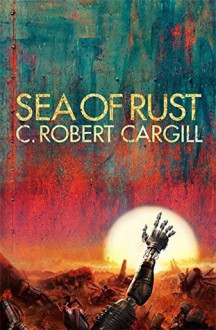
A lot of people love this book. Hell, a lot of people whose opinions I trust love this book. And that's great. One of the cool things about art is that it's subjective. I, unfortunately, did not love this book. In fact, after an hour long rant to my husband that started with "I don't hate it but...," I have been informed that I lied: I do hate this book. If you don't want any general spoilers don't read on, because I can't talk about my issues with this book without really digging in.
Here's my main issue: either this book is about gender, or it is about power, and either way I think it fails.
If this book is about gender then why is this one of the most binary books I've read in recent times? That would be expected if this came out in the 80s, but it didn't. This book was released in 2018. And there is no mention of anyone in this book that falls outside the very strict, sex based binary of male/female. There is mention of the rare man that grows a skein, and the rare woman that doesn't, but as a concept that isn't explored. And if it's a book about gender that should be explored, at least a little. Where are the non-binary people? Trans people (I especially wanted to know how trans women walked through this world)? Intersex people? Either Alderman didn't consider this, or didn't have a good answer and decided not to address it. Which means that if this book is trying to take on the topic of gender it falls short. A book about the "clash between the two sexes" comes off as outdated and, if I'm being totally honest, mildly offensive to me.
Okay, but the book is really more about power than gender, right? Okay. I'll buy that. It is the name of the book after all. But then my question becomes: what are you trying to say by writing this narrative? I want to preface this by saying I don't think all books need or want to say something beyond telling a story, nor should they. Sometimes, however, a book very clearly presents itself as attempting to interject a stance/idea into the cultural dialogue. Alderman very obviously wrote this book to say something, not to be a fun popcorn book. So what is she saying?
As near as I can tell the thesis of this book is that absolute power corrupts absolutely. That's an oldie but goodie, and I don't even entirely disagree with that premise. Here's the thing though, when you break it down more granularly this book seems to be saying, "if you give women more power than men they would be just as violent and cruel." Oh, and it would end the world. Not metaphorically. Literally. If women held the bulk of the power they would literally bomb us back to the stone age. If women held more power than men within a matter of a few years they would end civilization.
So here's the thing, I would not make the argument that women are inherently more gentle, level-headed, compassionate, blah blah blah, than men. I don't think that's true. At our core I don't think men and women are actually very different. However, releasing a book into the #metoo Trump era that essentially says if you give women power, they will use it to rape, murder, and destroy, is a pretty questionable thing to do. So I'm questioning it.
For example, there's this extremely uncomfortable section of the book from the perspective of Men's Rights Activists, and they are being their usual vitriolic terrible selves...except they aren't wrong. So we are supposed to empathize with them...I think? These horrible people describing all women as cunts that need to be put in their place are also totally correct about their fears and conspiracies. That's a hell of a thing to put into the world.
Side note: I also want to say that reading about sexual violence isn't any more palatable to me when the sexual roles are reversed. Reading numerous scenes where men are abused and raped, sometimes very graphically, wasn't something I particularly needed in my life. That's more of a personal taste thing than a general critique, but I felt I needed to include it as it absolutely effected the way I interacted with this book. Starting the story out with sexual violence against women, and basically ending it with sexual violence against men, made reading this book particularly grotesque for me, especially as a survivor.
Look, I think I see what Alderman was angling for when she wrote this book. However, when I really dig into it I don't think this is a message I wanted to ingest at this point in history. Given where we are now culturally this book comes off as exclusionary and misogynistic to me. Would that have been the case in the past? Probably not. But we've moved waaaaaaaay past 2nd wave feminism at this point. There will be a lot of people who disagree with my take on this, and that's totally fine. As always, your milage may vary. I for one, however, was left far more pissed off than empowered.


 Log in with Facebook
Log in with Facebook 









